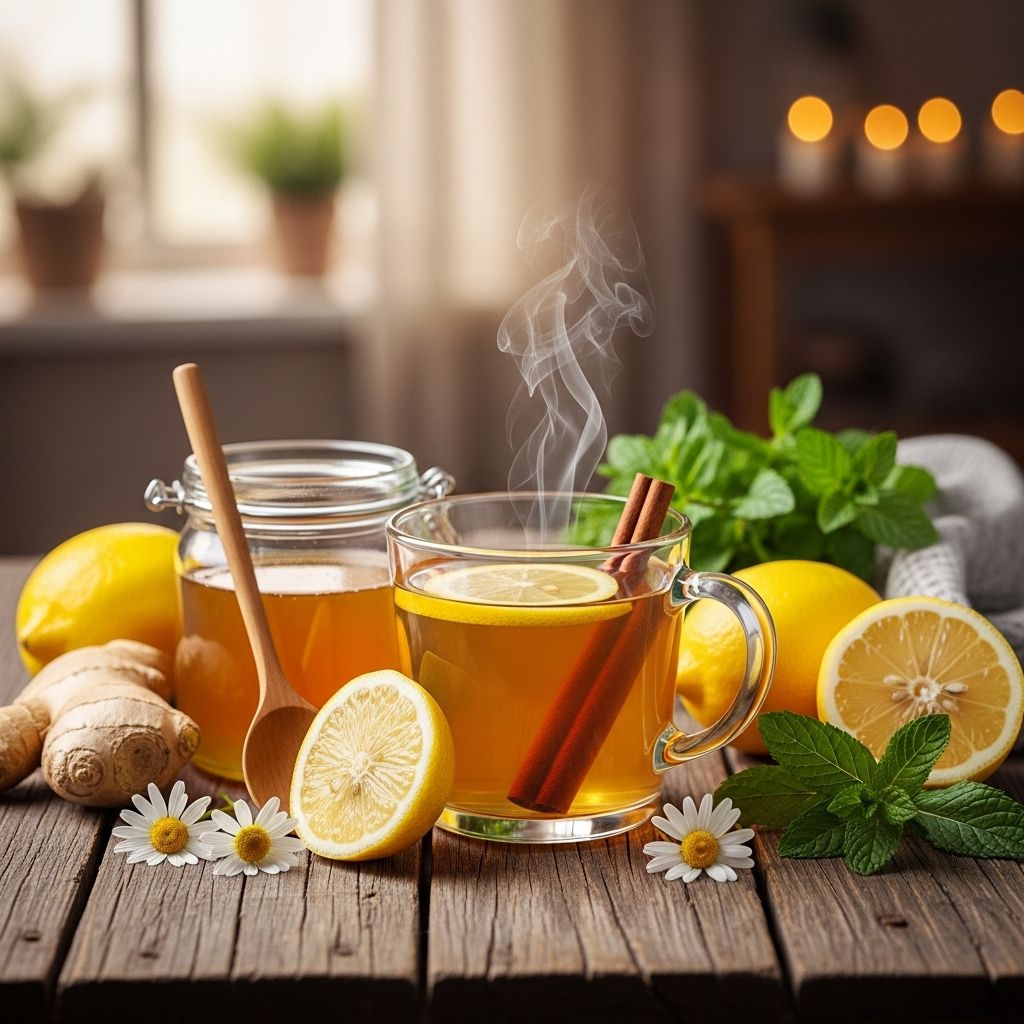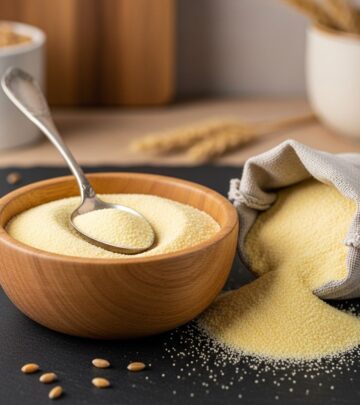Natural Home Remedies for Sore Throat Relief: Evidence-Based and Easy to Make
Discover the best at-home remedies for soothing sore throats, backed by research and tradition.

Table of Contents
- Causes and Symptoms of a Sore Throat
- Why Try Home Remedies for a Sore Throat?
- Popular Home Remedies for Sore Throat
- Herbal Teas and Beverages
- Gargling Solutions for Sore Throat Relief
- Other Natural Approaches
- Dosage and Usage Notes
- When to See a Doctor
- Frequently Asked Questions (FAQs)
Causes and Symptoms of a Sore Throat
A sore throat is a common condition characterized by pain, irritation, and difficulty swallowing. It is often a symptom of viral infections such as the common cold or influenza, though bacterial infections like strep throat can also be culprits. Other potential causes include allergies, dry air, pollution, and exposure to irritants like cigarette smoke.
Typical symptoms include:
- Pain or scratchiness in the throat
- Worsening pain when swallowing or talking
- Dryness in the throat
- Swollen glands in the neck or jaw
- Redness or white patches in the back of the throat
Why Try Home Remedies for a Sore Throat?
Most sore throats are caused by viruses and resolve on their own within a few days without medical treatment. Home remedies can provide significant relief from symptoms by reducing pain, soothing irritation, and promoting healing. Moreover, these remedies are generally safe, accessible, and affordable, making them a first-line option for many people.
Natural remedies are particularly attractive for those seeking to avoid over-the-counter medications or antibiotics, which are ineffective against viral infections and can cause side effects or contribute to antibiotic resistance.
Popular Home Remedies for Sore Throat
Honey
Honey is one of the most widely recommended home remedies for a sore throat. It possesses antimicrobial, anti-inflammatory, and soothing properties that can help relieve throat pain and suppress coughing. Research suggests that honey is as effective as some cough suppressants and may even surpass antibiotics and antihistamines in symptom relief for acute upper respiratory infections. Honey can be taken directly by the spoonful, added to tea, or mixed with lemon for extra benefit.
Saltwater Gargle
Gargling with warm salt water is a time-tested remedy that helps reduce swelling, soothe irritation, and clear mucus and bacteria from the throat. Mix half a teaspoon of salt in a cup of warm water and gargle several times a day for best results. This simple solution can help wash out infectious agents and provide temporary relief from pain and itchiness.
Baking Soda Gargle
A baking soda gargle, though less common, can also help relieve sore throats. The National Cancer Institute recommends combining 1 cup of warm water with 1/4 teaspoon of baking soda and 1/8 teaspoon of salt for a soothing rinse. This mixture may help neutralize acidity, reduce bacteria, and prevent fungal growth in the throat.
Ice Chips, Popsicles, and Lozenges
Sucking on ice chips or popsicles can numb the throat and reduce pain, especially in children. Over-the-counter lozenges and cough drops often contain menthol, which provides a cooling sensation and can temporarily numb the throat, offering relief from discomfort and the urge to cough.
Stay Hydrated
Drinking plenty of fluids helps keep the throat moist and may prevent irritation. Water, herbal teas, and clear broths are excellent choices. Avoid caffeinated and alcoholic beverages, as they can contribute to dehydration.
Humidified Air
Dry air can exacerbate sore throat symptoms. Using a humidifier in your bedroom or spending time in a steamy bathroom can help maintain moisture in the throat and reduce irritation.
Herbal Teas and Beverages
Chamomile Tea
Chamomile tea is naturally soothing and has been used medicinally for centuries. It contains anti-inflammatory, antioxidant, and astringent properties that may help reduce throat inflammation and promote healing. Drinking chamomile tea may also stimulate the immune system, aiding the body’s natural defenses.
Peppermint Tea
Peppermint tea is known for its anti-inflammatory, antibacterial, and antiviral properties. The menthol in peppermint helps thin mucus and calm sore throats and coughs. You can make peppermint tea by steeping dried leaves in boiling water or use diluted peppermint oil sprays for direct relief.
Licorice Root Tea
Licorice root has been shown in some studies to be more effective than placebo in soothing sore throat pain, at least in the short term. Licorice root tea can be made by steeping the root in hot water, but it should be used in moderation, especially by those with high blood pressure, due to its potential effects on blood pressure.
Marshmallow Root Infusion
Marshmallow root contains mucilage, a gelatinous substance that coats and soothes the throat. To make a cold infusion, place 28 grams of dried marshmallow root in a liter of cold water and let it steep overnight. Sip the infusion throughout the day to ease throat discomfort.
Sage-Echinacea Throat Spray
A homemade sage-echinacea spray can be an effective alternative to over-the-counter antiseptic sprays. Steep one teaspoon each of ground sage and echinacea in half a cup of boiling water for 30 minutes, strain, and transfer to a spray bottle. Spray into the throat every two hours as needed.
Gargling Solutions for Sore Throat Relief
| Solution | Ingredients | Frequency | Benefits |
|---|---|---|---|
| Saltwater Gargle | 1/2 tsp salt, 1 cup warm water | Every 1–2 hours | Reduces swelling, clears mucus, soothes pain |
| Baking Soda Gargle | 1/4 tsp baking soda, 1/8 tsp salt, 1 cup warm water | 3–4 times daily | Neutralizes acidity, reduces bacteria and fungi |
| Apple Cider Vinegar Gargle | 1 tsp apple cider vinegar, 1 cup warm water | 3 times daily | May have antimicrobial properties |
Other Natural Approaches
Apple Cider Vinegar
Apple cider vinegar is a traditional remedy for sore throats, with anecdotal evidence suggesting its acetic acid content may help fight bacteria. A classic folk recipe combines apple cider vinegar and honey, known as oxymel, which was prescribed by Hippocrates for respiratory ailments.
Chicken Soup
Chicken soup is more than just comfort food; it can help hydrate the body, provide easily digestible nutrients, and may have mild anti-inflammatory effects that soothe the throat.
Elm Bark
Slippery elm bark, like marshmallow root, contains mucilage that coats the throat and provides relief from irritation. Elm bark lozenges or teas are traditional remedies, though they are less commonly used today.
Avoid Irritants
People with sore throats should avoid exposure to cigarette smoke, pollution, and harsh cleaning chemicals, as these can further irritate the throat and delay healing.
Dosage and Usage Notes
- Honey: 1–2 teaspoons as needed, but avoid giving to children under one year due to the risk of infant botulism.
- Saltwater Gargle: Mix 1/2 teaspoon salt in 8 ounces of warm water, gargle every 1–2 hours as needed.
- Baking Soda Gargle: 1/4 teaspoon baking soda plus 1/8 teaspoon salt in 8 ounces warm water, 3–4 times daily.
- Herbal Teas: Drink 2–3 cups per day for soothing relief.
- Lozenges and Sprays: Follow package instructions or use as needed for symptom relief.
When to See a Doctor
Most sore throats resolve within a week with home care. However, you should seek medical attention if you experience:
- Severe pain or difficulty swallowing or breathing
- A sore throat lasting more than a week
- High fever (above 101°F or 38.3°C)
- Swollen lymph nodes or a rash
- Blood in saliva or phlegm
- Recurring sore throats
These symptoms could indicate a bacterial infection or another underlying condition requiring medical treatment.
Frequently Asked Questions (FAQs)
How long does a sore throat usually last?
Most sore throats caused by viruses improve within 3–7 days with home care. Persistent symptoms beyond a week may require medical evaluation.
Is honey safe for children with sore throats?
Honey is generally safe for children over one year old and can be effective in soothing sore throats and coughs. It should not be given to infants under one year due to the risk of botulism.
Can gargling with salt water help prevent a sore throat?
There is no strong evidence that saltwater gargling prevents sore throats, but it can help reduce symptoms once they occur by soothing irritation and clearing mucus and bacteria from the throat.
Are herbal teas effective for sore throats?
Herbal teas such as chamomile, peppermint, and licorice root can provide soothing relief and have anti-inflammatory properties, but they do not cure the underlying infection.
When should I worry about a sore throat?
See a doctor if your sore throat is severe, lasts more than a week, is accompanied by high fever, difficulty breathing, or swollen glands, or if you have recurrent episodes.
Can I use essential oils for sore throat relief?
Some essential oils, like peppermint, may provide temporary relief when diluted and used in sprays or diffusers, but they should never be ingested undiluted. Always follow safety guidelines and consult with a healthcare provider before use.
References
- https://www.healthline.com/health/cold-flu/sore-throat-natural-remedies
- https://www.webmd.com/cold-and-flu/remedies-for-sore-throat
- https://www.medicalnewstoday.com/articles/318631
- https://pennstatehealthnews.org/2023/12/the-medical-minute-five-home-remedies-can-soothe-your-sore-throat/
- https://health.clevelandclinic.org/sore-throat-remedies-that-actually-work
- https://www.uclahealth.org/news/article/hot-sauce-and-other-home-remedies-for-a-sore-throat
- https://www.uchicagomedicineadventhealth.org/blog/sore-throat-remedies-whole-family
- https://greaterknoxent.com/sore-throat-relief-home-remedies-when-to-seek-professional-help/
- https://vicks.com/en-us/treatments/sore-throat/10-remedies-to-soothe-your-sore-throat-pain
- https://stjohns.ufhealth.org/news-and-blogs/2022/january/home-remedies-for-a-sore-throat/
Read full bio of Sneha Tete












